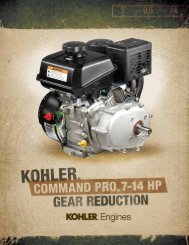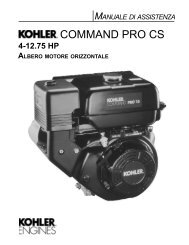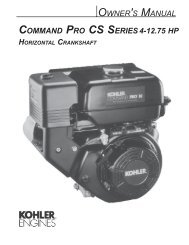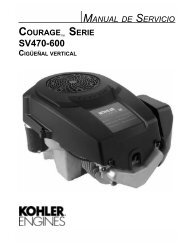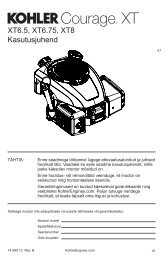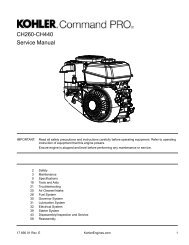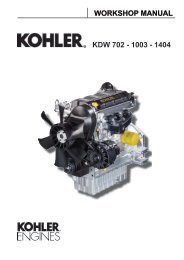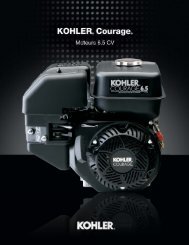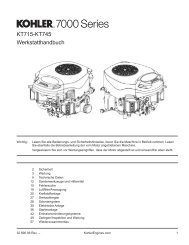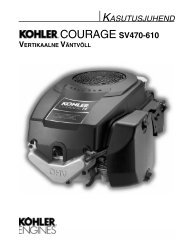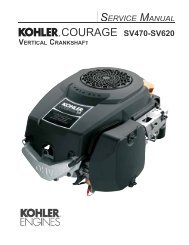You also want an ePaper? Increase the reach of your titles
YUMPU automatically turns print PDFs into web optimized ePapers that Google loves.
OWNER'S MANUALKOHLER AEGIS ®LV625, LV675, LV680LIQUID-COOLEDVERTICAL CRANKSHAFT
Safety PrecautionsTo ensure safe operations please read the following statements and understand their meaning.Also refer to your equipment owner's manual for other important safety information. This manualcontains safety precautions which are explained below. Please read carefully.WARNINGWarning is used to indicate the presence of a hazard that can cause severe personal injury, death,or substantial property damage if the warning is ignored.CAUTIONCaution is used to indicate the presence of a hazard that will or can cause minor personal injuryor property damage if the caution is ignored.NOTENote is used to notify people of installation, operation, or maintenance information that is importantbut not hazard-related.For Your Safety!These precautions should be followed at all times. Failure to follow these precautions could resultin injury to yourself and others.WARNINGWARNINGWARNINGExplosive Fuel can cause fires andsevere burns.Stop engine before filling fuel tank.Explosive Fuel!Gasoline is extremely flammableand its vapors can explode ifignited. Store gasoline only inapproved containers, in wellventilated, unoccupied buildings,away from sparks or flames. Do notfill the fuel tank while the engine ishot or running, since spilled fuelcould ignite if it comes in contactwith hot parts or sparks fromignition. Do not start the engine nearspilled fuel. Never use gasoline as acleaning agent.Hot liquid can cause severe burns.Do not loosen radiator cap whileengine is operating or warm to thetouch.Hot Liquid!The liquid coolant can get extremelyhot from operation. Turning theradiator cap when the engine is hotcan allow steam and scalding liquidto blow out and burn you severely.Shut off machine. Only removeradiator cap when cool enough totouch with bare hands. Slowlyloosen cap to first stop to relievepressure before removingcompletely.Hot Parts can cause severe burns.Do not touch engine while operatingor just after stopping.Hot Parts!Engine components can getextremely hot from operation. Toprevent severe burns, do not touchthese areas while the engine isrunning, or immediately after it isturned off. Never operate the enginewith heat shields or guardsremoved.CaliforniaProposition 65 WarningEngine exhaust from this productcontains chemicals known to theState of California to causecancer, birth defects, or otherreproductive harm.2
WARNINGSafety Precautions (Cont.)WARNINGWARNINGAccidental Starts can cause severeinjury or death.Disconnect and ground spark plugleads before servicing.Accidental Starts!Disabling engine. Accidentalstarting can cause severe injuryor death. Before working on theengine or equipment, disable theengine as follows: 1) Disconnect thespark plug lead(s). 2) Disconnectnegative (-) battery cable frombattery.CAUTIONElectrical Shock can cause injury.Do not touch wires while engine isrunning.Electrical Shock!Never touch electrical wires orcomponents while the engine isrunning. They can be sources ofelectrical shock.Carbon Monoxide can causesevere nausea, fainting or death.Do not operate engine in closed orconfined area.Lethal Exhaust Gases!Engine exhaust gases containpoisonous carbon monoxide.Carbon monoxide is odorless,colorless, and can cause death ifinhaled. Avoid inhaling exhaustfumes, and never run the engine ina closed building or confined area.WARNINGRotating Parts can cause severeinjury.Stay away while engine is inoperation.Rotating Parts!Keep hands, feet, hair, and clothingaway from all moving parts toprevent injury. Never operate theengine with covers, shrouds, orguards removed.Explosive Gas can cause fires andsevere acid burns.Charge battery only in a wellventilated area. Keep sources ofignition away.Explosive Gas!Batteries produce explosivehydrogen gas while being charged.To prevent a fire or explosion,charge batteries only in wellventilated areas. Keep sparks, openflames, and other sources of ignitionaway from the battery at all times.Keep batteries out of the reach ofchildren. Remove all jewelry whenservicing batteries.Before disconnecting the negative(-) ground cable, make sure allswitches are OFF. If ON, a spark willoccur at the ground cable terminalwhich could cause an explosion ifhydrogen gas or gasoline vaporsare present.Congratulations – You have selected a fine four-cycle, twin cylinder, liquid-cooled engine. <strong>Kohler</strong> designs longlife strength and on-the-job durability into each engine...making a <strong>Kohler</strong> engine dependable...dependability youcan count on. Here are some reasons why:• Efficient overhead valve design, and pressure lubrication provide maximum power, torque, and reliabilityunder all operating conditions.• Dependable, maintenance free electronic ignition ensures fast, easy starts time after time.• <strong>Kohler</strong> engines are easy to service. All routine service areas (like the dipstick and oil fill, air cleaner, sparkplugs, and carburetor) are easily and quickly accessible.• Parts subject to the most wear and tear (like the cylinder liner and camshaft) are made from precisionformulated cast iron.• Every <strong>Kohler</strong> engine is backed by a worldwide network of over 10,000 distributors and dealers. Servicesupport is just a phone call away. Call 1-800-544-2444 (U.S. & Canada) for Sales & Service assistance.To keep your engine in top operating condition, follow the maintenance procedures in this manual.3
EngineIdentification LabelUpper Blower Housing andAir Intake Screen AssemblyRetainingStrapOil Fill/DipstickElectricStarterSpark PlugValve Cover withIntegral BreatherSparkPlugFuelPumpOil FilterFigure 1. Typical <strong>Kohler</strong> Aegis ®Vertical Shaft Engine.Oil RecommendationsUsing the proper type and weight of oil in thecrankcase is extremely important. So is checking oildaily and changing oil regularly. Failure to use thecorrect oil, or using dirty oil, causes premature enginewear and failure.hours using standard petroleum based oilbefore switching to synthetic oil.A logo or symbol on oil containers identifies the APIservice class and SAE viscosity grade. See Figure 3.Oil TypeUse high quality detergent oil of API (AmericanPetroleum Institute) service class SG, SH, SJ orhigher. Synthetic oils may be used. Select the viscositybased on the air temperature at the time of operation asshown in the following table.***Figure 3. Oil Container Logo.Refer to “Maintenance Instructions” beginning onpage 8 for detailed oil check, oil change, and oilfilter change procedures.Fuel Recommendations*Use of synthetic oil having 5W-20 or 5W-30 rating is acceptable,up to 4°C (40°F).**Synthetic oils will provide better starting in extreme cold below23°C (-10°F).Figure 2. Viscosity Grades Table.NOTE:NOTE:Using other than service class SG, SH, SJ orhigher oil or extending oil change intervalslonger than recommended can cause enginedamage.Synthetic oils meeting the listed classificationsmay be used with oil changes performed atthe recommended intervals. However to allowpiston rings to properly seat, a new or rebuiltengine should be operated for at least 50WARNING: Explosive Fuel!Gasoline is extremely flammable and its vapors canexplode if ignited. Store gasoline only in approvedcontainers, in well ventilated, unoccupied buildings,away from sparks or flames. Do not fill the fuel tankwhile the engine is hot or running, since spilled fuelcould ignite if it comes in contact with hot parts orsparks from ignition. Do not start the engine nearspilled fuel. Never use gasoline as a cleaning agent.General RecommendationsPurchase gasoline in small quantities and store inclean, approved containers. A container with a capacityof 2 gallons or less with a pouring spout isrecommended. Such a container is easier to handleand helps eliminate spillage during refueling.4
Do not use gasoline left over from the previous season,to minimize gum deposits in your fuel system and toensure easy starting.Do not add oil to the gasoline. Do not overfill the fueltank. Leave room for the fuel to expand.Fuel TypeFor best results use only clean, fresh, unleadedgasoline with the pump sticker octane rating of 87 orhigher. In countries using the Research method, itshould be 90 octane minimum.Unleaded gasoline is recommended as it leaves lesscombustion chamber deposits. Leaded gasoline maybe used in areas where unleaded is not available andexhaust emissions are not regulated. Be awarehowever, that the cylinder heads may require morefrequent service.Gasoline/Alcohol blendsGasohol (up to 10% ethyl alcohol, 90% unleadedgasoline by volume) is approved as a fuel for <strong>Kohler</strong>engines. Other gasoline/alcohol blends are notapproved.Gasoline/Ether blendsMethyl Tertiary Butyl Ether (MTBE) and unleadedgasoline blends (up to a maximum of 15% MTBE byvolume) are approved as a fuel for <strong>Kohler</strong> engines.Other gasoline/ether blends are not approved.Coolant RecommendationsUse equal parts of ethylene glycol (anti-freeze) andwater only. Distilled or deionized water isrecommended, especially in areas where the watercontains a high mineral content. Propylene glycolbased anti-freeze is not recommended.This mixture will provide protection from -37°C (-34°F)to 108°C (226°F). For protection and use outside theindicated temperature limits, follow the anti-freezemanufacturers instructions on the container, but do notexceed 70% anti-freeze.DO NOT use anti-freeze with stop-leak additive(s), orput any other additives in the cooling system.Engine Identification NumbersWhen ordering parts, or in any communicationinvolving an engine, always give the Model,Specification, and Serial Numbers of the engine.The engine identification numbers appear on a decalaffixed to the engine blower housing. Include lettersuffixes, if there are any.Record your engine identification numbers on theidentification label (Figure 4) for future reference.IMPORTANT ENGINE INFORMATIONTHIS ENGINE MEETS U.S. EPA AND CA 2005AND LATER AND EC STAGE II (SN:4) EMISSIONREGS FOR SI SMALL OFF–ROAD ENGINESFAMILYTYPE APPDISPL. (CC)MODEL NO.N11236SPEC. NO.SERIAL NO.BUILD DATEOEM PROD. NO.EMISSION COMPLIANCE PERIOD:EPA:CARB:CERTIFIED ON:REFER TO OWNER'S MANUAL FOR HP RATING,SAFETY, MAINTENANCE AND ADJUSTMENTS1-800-544-2444 www.kohlerengines.comKOHLER CO. KOHLER, WISCONSIN USAFigure 4. Engine Identification Label.The Emission Compliance Period referred to on theEmission Control or Air Index label indicates thenumber of operating hours for which the engine hasbeen shown to meet Federal and CARB emissionrequirements. The following table provides the EngineCompliance Period (in hours) associated with thecategory descriptor found on the certification label.EPACARBEmission Compliance Period (Hours)Refer to certification label for engine displacement.Exhaust Emission Control System for models LV625,LV675, and LV680 is EM.Model DesignationModel LV625 for example: L designates liquid cooled,V designates vertical crankshaft, and 625 is the modeldesignation. A letter suffix designates a specificversion as follows:SuffixSCategory C250 HoursModerate125 HoursCategory B500 HoursIntermediate250 HoursDesignatesElectric StartCategory A1000 HoursExtended500 Hours5
Operating InstructionsAlso read the operating instructions of the equipment this engine powers.Pre-Start Checklist• Check oil level. Add oil if low. Do not overfill.• Check coolant level. Add coolant if low.• Check fuel level. Add fuel if low.• Check radiator, cooling air intake areas andexternal surfaces of engine. Make sure they areclean and unobstructed.• Check that the air cleaner components and allshrouds, equipment covers, and guards are inplace and securely fastened.• Check that any clutches or transmissions aredisengaged or placed in neutral. This is especiallyimportant on equipment with hydrostatic drive. Theshift lever must be exactly in neutral to preventresistance which could keep the engine fromstarting.WARNING: Lethal Exhaust Gases!Engine exhaust gases contain poisonous carbonmonoxide. Carbon monoxide is odorless, colorless,and can cause death if inhaled. Avoid inhaling exhaustfumes, and never run the engine in a closed building orconfined area.Cold Weather Starting Hints1. The cooling system must be filled with coolantcapable of providing proper protection againstfreezing at the lowest temperature expected (see‘‘Coolant Recommendations’’ on page 5).2. Be sure to use the proper oil for the temperatureexpected. See Figure 2 on page 4.3. Declutch all possible external loads.4. A warm battery has much more starting capacitythan a cold battery.5. Use fresh winter grade fuel. NOTE: Winter gradegasoline has higher volatility to improve starting.Do not use gasoline left over from summer.Starting1. Place the throttle control midway between the“slow” and “fast” positions. Place the chokecontrol into the “on” position.2. Start the engine by activating the key switch.Release the switch as soon as the engine starts.NOTE:NOTE:Do not crank the engine continuously formore than 10 seconds at a time. If theengine does not start, allow a 60 secondcool down period between startingattempts. Failure to follow theseguidelines can burn out the starter motor.Upon start-up, a metallic ticking mayoccur. This is caused by hydraulic lifterleakdown during storage. Run the enginefor 5 minutes. The noise will normallycease in the first minute. If noisecontinues, run the engine at mid-throttlefor 20 minutes. If noise persists, take theengine to your local <strong>Kohler</strong> Service outlet.If the starter does not turn the engine over, shutoff starter immediately. Do not make furtherattempts to start the engine until the condition iscorrected. Do not jump start using another battery(refer to “Battery” on page 7). See your <strong>Kohler</strong>Engine Service Dealer for trouble analysis.3. For a Cold Engine – Gradually return the chokecontrol to the “off” position after the engine startsand warms up.The engine/equipment may be operated duringthe warm up period, but it may be necessary toleave the choke partially on until the engine warmsup.4. For a Warm Engine – Return choke to “off”position as soon as engine starts.Stopping1. Remove the load by disengaging all PTOattachments.2. Position the throttle control somewhere betweenhalf and full throttle; then stop the engine.6
BatteryA 12 volt battery is normally used. Refer to theoperating instructions of the equipment this enginepowers for specific battery requirements.If the battery charge is not sufficient to crank theengine, recharge the battery (see page 15).OperatingAngle of OperationThis engine will operate continuously at angles up to20°. Check oil level to assure crankcase oil level is atthe “FULL” mark on the dipstick.Refer to the operating instructions of the equipmentthis engine powers. Because of equipment design orapplication, there may be more stringent restrictionsregarding the angle of operation.NOTE:Do not operate this engine continuously atangles exceeding 20° in any direction. Enginedamage could result from insufficientlubrication.CoolingNOTE: If debris builds up on the air intake screen,radiator, or other cooling areas, stop theengine immediately and clean. Operating theengine with blocked or dirty air intake andcooling areas can cause extensive damagedue to overheating. See ‘‘Clean Air Intake/Cooling Area’’, page 14.High Temperature SensorSome engines are equipped with a high temperaturesensor mounted in the cooling system. If the safeoperating temperature is exceeded, it will either shutoff the engine or activate a warning signal, dependingon the application.If the warning light illuminates or engine kills indicatingexcessive operating temperatures:1. Make sure all air intake and cooling surfaces areclean and free of debris.2. After engine has sufficiently cooled, check thecoolant level in system to make sure it is not low.See ‘‘Checking Coolant Level’’, page 10.3. Check the system for external leaks.4. If the cause is none of the above or cannot beidentified, contact an Authorized <strong>Kohler</strong> EngineDealer for appropriate diagnosis and correction.WARNING: Hot Parts!Engine components can get extremely hot fromoperation. To prevent severe burns, do not touch theseareas while the engine is running, or immediately afterit is turned off. Never operate the engine with heatshields or guards removed.Engine SpeedNOTE: Do not tamper with the governor setting toincrease the maximum engine speed.Overspeed is hazardous and will void theengine warranty. The maximum allowable highidle speed for these engines is 3750 RPM.7
Maintenance InstructionsMaintenance, repair, or replacement of the emission control devices and systems, which are being done atthe customers expense, may be performed by any non-road engine repair establishment or individual.Warranty repairs must be performed by an authorized <strong>Kohler</strong> service outlet.WARNING: Accidental Starts!Disabling engine. Accidental starting can cause severe injury or death. Before working on the engine orequipment, disable the engine as follows: 1) Disconnect the spark plug lead(s). 2) Disconnect negative (-) batterycable from battery.Maintenance ScheduleThese required maintenance procedures should be performed at the frequency stated in the table. They shouldalso be included as part of any seasonal tune-up.FrequencyDaily or BeforeStarting EngineEvery 25 HoursEvery 100 HoursAnnually orEvery 200 HoursAnnually orEvery 500 HoursEvery 2 Years orEvery 1000 HoursMaintenance Required• Fill fuel tank.• Check oil level.• Check coolant level.• Check air cleaner for dirty 1 , loose, or damaged parts.• Check air intake screen, radiator, and cooling areas, clean as necessary 1 .• Service precleaner element 1 .• Replace air cleaner element 1 .• Clean and check cooling areas 1 .• Change oil and oil filter (more frequently under severe conditions).• Check spark plug condition and gap.• Replace fuel filter.• Have solenoid shift starter disassembled and cleaned 2 .• Replace spark plugs.• Change engine coolant.1Perform these maintenance procedures more frequently under extremely dusty, dirty conditions.2Only required for Denso starters. Not necessary on Delco starters. Have a <strong>Kohler</strong> Engine Service Dealer performthis service.Check Oil LevelThe importance of checking and maintaining the properoil level in the crankcase cannot be overemphasized.Check oil BEFORE EACH USE as follows:1. Make sure the engine is stopped, level, and iscool so the oil has had time to drain into the sump.2. To keep dirt, debris, etc., out of the engine, cleanthe area around the dipstick before removing it.3. Unthread and remove the dipstick; wipe oil off.Reinsert the dipstick into the tube and rest the oilfill cap on the tube. Do not thread the cap onto thetube. See Figure 5.Figure 5. Checking Oil Level.4. Pull the dipstick out and check the oil level.The oil level should be up to, but not over, the“FULL” mark on the dipstick. See Figure 6.8
OperatingRange"Full" Mark2. Remove one of the oil drain plugs and the oil fillcap/dipstick. Be sure to allow ample time forcomplete drainage.3. Before removing the oil filter, clean the areaaround the oil filter to keep dirt and debris out ofthe engine. Remove the old filter and wipe off thefilter adapter with a clean cloth.4. Reinstall the drain plug. Make sure it is tightenedto 13.6 N·m (10 ft. lb.) torque.Figure 6. Oil Level Dipstick.5. If the level is low, add oil of the proper type, up tothe “FULL” mark on the dipstick. (Refer to “OilType” on page 4.) Always check the level with thedipstick before adding more oil.NOTE:To prevent extensive engine wear ordamage, always maintain the proper oillevel in the crankcase. Never operate theengine with the oil level below the “ADD”mark or over the “FULL” mark on thedipstick.Oil Sentry Some engines are equipped with an optional OilSentry oil pressure switch. If the oil pressuredecreases below an acceptable level, the Oil Sentry will either shut off the engine or activate a warningsignal, depending on the application.NOTE:Make sure the oil level is checked BEFOREEACH USE and is maintained up to the“FULL” mark on the dipstick. This includesengines equipped with Oil Sentry .Change Oil and FilterChange the oil and oil filter every 200 hours orannually, whichever comes first (more often undersevere conditions). Refill with service class SG, SH, SJor higher oil, as specified in the ‘‘Viscosity Grades’’table (Figure 2) on page 4. Always use a genuine<strong>Kohler</strong> oil filter, Part No. 52 050 02-S.5. Place a new replacement filter in a shallow panwith the open end up. Pour new oil, of the propertype, in through the threaded center hole. Stoppouring when the oil reaches the bottom of thethreads. Allow a minute or two for the oil to beabsorbed by the filter material.6. Apply a thin film of clean oil to the rubber gasketon the new filter.7. Install the new oil filter to the filter adapter. Handtighten the filter clockwise until the rubber gasketcontacts the adapter, then tighten the filter anadditional 2/3 to 1 turn.8. Fill the crankcase with new oil of the proper type,to the ‘‘FULL’’ mark on the dipstick. Refer to ‘‘OilType’’ and ‘‘Check Oil Level’’ on pages 4 and 8.Always check the level with the dipstick beforeadding more oil.9. Reinstall the oil fill cap/dipstick and tightensecurely by turning to the right.Oil Drain PlugChange the oil while the engine is still warm. The oilwill flow more freely and carry away more impurities.Make sure the engine is level when filling, checking, orchanging the oil.Change the oil and oil filter as follows (see Figure 7):1. To keep dirt, debris, etc., out of the engine, cleanthe area around the oil fill cap/dipstick beforeremoving it.OilFilterOil Drain PlugFigure 7. Oil Drain Plugs and Oil Filter.9
Cooling System Maintenance and ServiceImportant service notes:• Do not operate the engine without coolant insystem.• Do not remove the radiator cap when hot. Enginecoolant is hot and under pressure and can causesevere burns.• To prevent engine overheating and damage, usethe recommended anti-freeze mixture in thecooling system.• To prevent engine damage, do not pour cold waterinto a hot engine.Figure 8. Unhooking Retaining Straps.• To prevent engine damage, do not use anti-freezewith stop-leak additive(s) or put other additives inthe cooling systems.• Cooling system capacity is approximately 1.4 L(1.47 qt.).MaintenanceThis engine is liquid-cooled, circulating a mixture ofethylene glycol and water for dependable operation. Apump is used to circulate the coolant through thesystem and radiator. A thermostat contained in thesystem assures automatic temperature control andrapid warm-up. Correct coolant level and cleaning anydebris accumulation from the inlet screen and radiatorsurfaces are critical to insuring long life, proper systemperformance, and preventing overheating. Check thecoolant level in the overflow reservoir, and clean awayany debris accumulation daily or before each use. Atthe same time, inspect the hoses and all connectionsfor signs of leakage.ServicingEngine coolant should be changed every 2 years orevery 1000 hours, whichever comes first. Whenchanging the engine coolant, the system should alsobe flushed to remove any contaminants left behindduring draining. Following are recommendedprocedures for checking, draining, flushing, and fillingthe cooling system.Figure 9. Removing Upper Blower Housing andScreen Assembly.2. Check the coolant level within the overflowreservoir. Coolant level should be between the‘‘Max. Level’’ and ‘‘Min. Level’’ marks on thereservoir. See Figure 10. Do not operate theengine with the coolant level below the ‘‘Min.Level’’ mark.Add coolant to the overflow reservoir as required.Use equal parts of ethylene glycol and water only(distilled or deionized water is recommended).Checking Coolant LevelThe coolant level should be checked at the overflowreservoir, located under the upper blower housingassembly.1. Unhook the retaining straps and remove the upperblower housing and screen assembly. See Figures8 and 9.Figure 10. Coolant Levels on Reservoir.10
Draining Cooling System1. Stop the engine and allow it to cool sufficiently.2. Unhook the four retaining straps, and remove theupper blower housing and screen assembly. SeeFigures 8 and 9.3. Check if the radiator is cool to the touch. Slowlyloosen the radiator cap to the first stop and allowany pressure to bleed off. Then fully loosen andremove it.Loosen ScrewsFigure 13. Loosening Screws.6. Remove the reservoir cap. Carefully tip thebracket away from the reservoir, and lift thereservoir out between the bracket and fan. SeeFigures 14 and 15. Pour out the contents of thereservoir and wash out or clean as required.Dispose of all the old coolant properly, accordingto local regulations.Figure 11. Removing Radiator Cap.4. Locate and remove the coolant drain plug in thelower side of both cylinder heads. See Figure 12.Drain the coolant into a suitable container. Afterthe coolant has drained, apply pipe sealant withTeflon ® (not Teflon ® tape) to the threads andreinstall the plugs. Torque the plugs to 13.5 N·m(120 in. lb.).Coolant Drain PlugsMolded Protrusionfor MountingFigure 14. Tipping Bracket Away after RemovingReservoir Cap.Figure 12. Location of Coolant Drain Plugs.5. The coolant overflow reservoir has 3 moldedprotrusions (1 upper, 2 lower, see Figure 14) thatfit into corresponding holes in the supportbrackets. Loosen the two screws that fasten theupper bracket to the radiator. See Figure 13.Figure 15. Removing Reservoir.11
7. Reinstall the reservoir, engaging the two lowermolded protrusions in the mounting holes of thesupport bracket. Engage the top bracket aroundthe upper protrusion. Hold it in this position andtorque the screws to 7.3 N·m (65 in. lb.).8. Reinstall the reservoir cap. Do not kink/pinch thehose.9. Flush the cooling system (see ‘‘Flushing CoolingSystem’’).Flushing Cooling SystemWith system properly drained:1. Fill the cooling system with clean water and acooling system cleaner recommended foraluminum engines. Follow the directions on thecontainer.2. Reinstall and tighten the radiator cap.3. Reinstall the upper blower housing assembly.Secure with the retaining straps.4. Start and run the engine for five minutes, or until itreaches operating temperature. Stop the engineand allow it to cool.5. Remove the upper blower housing and drain thecooling system (Refer to ‘‘Draining CoolingSystem’’).6. Fill the cooling system (see ‘‘Filling CoolingSystem’’).7. Reinstall the upper blower housing and screenassembly.Filling Cooling System1. Check the condition of cooling system hoses,clamps, and associated components. Replace asrequired.2. Mix equal parts of ethylene glycol anti-freeze anddistilled or deionized water (see ‘‘CoolantRecommendations’’ on page 5). For extremelycold temperature applications or protectionoutside the limits listed in the ‘‘CoolantRecommendations’’ Section, refer to the antifreezemanufacturers instructions on thecontainer, but do not exceed 70% anti-freeze.3. Fill the radiator with the coolant mixture. Allowcoolant to drain into the lower areas. Fill theoverflow reservoir to a level between the ‘‘Max.Level’’ and ‘‘Min. Level’’ marks. See Figure 10.Reinstall the radiator and reservoir caps.4. Reinstall the upper blower housing and screenassembly. Start and run the engine for fiveminutes. Stop the engine and cool.5. Remove the blower housing and recheck coolantlevel in reservoir. Coolant level should be betweenthe ‘‘Max. Level’’ and ‘‘Min. Level’’ marks. Addcoolant to reservoir if required. See Figure 10.6. Reinstall the upper blower housing and screenassembly. Secure with the retaining straps.Service Precleaner and Air Cleaner ElementThis engine is equipped with a replaceable, highdensity paper air cleaner element surrounded by anoiled foam precleaner, located under the upper blowerhousing. See Figure 16.Check the air cleaner and air intake screen daily orbefore starting the engine. Check for a buildup of dirtand debris around the air cleaner system. Keep theseareas clean. Also check for loose or damagedcomponents. Replace all bent or damaged air cleanercomponents. Do not operate the engine without theupper blower housing and screen assembly installed.NOTE:PrecleanerOperating the engine with loose, damaged, ormissing air intake components can allowunfiltered air into the engine, causingpremature wear and failure.Figure 16. Air Cleaner Assembly.Element12
Service PrecleanerWash and reoil the precleaner every 25 hours ofoperation (more often under extremely dusty or dirtyconditions).1. Unhook the four retaining straps and remove theupper blower housing and screen assembly. SeeFigures 8 and 9.2. Remove the foam precleaner from the paperelement. See Figure 17.Figure 19. Unsnapping Screen Assembly.Figure 17. Removing Precleaner from PaperElement.3. Wash the precleaner in warm water with detergent.Rinse the precleaner thoroughly until all traces ofdetergent are eliminated. Squeeze out excesswater (do not wring). Allow the precleaner to air dry.4. Saturate the precleaner with new engine oil.Squeeze out all excess oil.5. Clean the air cleaner base area, upper blowerhousing, and screen assembly of any debrisaccumulation. If required, the screen assembly mayalso be separated from the upper blower housingby unsnapping it from the underside. See Figures18, 19, and 20. Check all parts for wear, cracks, ordamage. Replace any damaged components.Figure 20. Removing Screen Assembly.6. Reinstall the precleaner over the paper element,outside the element retaining strap.7. Reinstall the upper blower housing and screenassembly. Secure with the four retaining straps.8. When precleaner replacement is necessary, order<strong>Kohler</strong> Part No. 66 083 03-S.Service Paper ElementEvery 100 hours of operation (more often underextremely dusty or dirty conditions), replace the paperelement.1. Unhook the four retaining straps and remove theupper blower housing and screen assembly. SeeFigures 8 and 9.2. Remove the foam precleaner from the paperelement. See Figure 17. Service or replace theprecleaner.Figure 18. Clean Away Debris.13
3. Unhook the element retaining strap and removethe paper element from the air cleaner base. SeeFigure 21.Figure 21. Unhooking Retaining Strap.4. Do not wash the paper element or usepressurized air, as this will damage the element.Replace a dirty, bent, or damaged element with anew genuine <strong>Kohler</strong> element. Handle newelements carefully. Do not use if the sealingsurfaces are bent or damaged.5. Clean the air cleaner base area, upper blowerhousing, and screen assembly of any debrisaccumulation. If required, the screen assemblymay also be separated from the blower housing byunsnapping it from the underside. See Figures 18,19, and 20. Check all parts for wear, cracks, ordamage. Replace any damaged components.Clean Air Intake/Cooling AreasTo ensure proper air circulation, make sure the airintake screen, radiator, cooling fins, and other externalsurfaces of the engine are kept clean at all times.Every 100 hours of operation (more often underextremely dusty, dirty conditions), remove the upperblower housing assembly. Clean the cooling fins of theradiator, external surfaces, and the air intake screenand blower housing assembly as necessary. Thescreen assembly may also be separated from theupper blower housing to permit more thoroughcleaning if required. See Figures 18, 19, and 20. Makesure all parts are reinstalled before starting the engine.If the screen assembly was separated from the blowerhousing, push the upper retaining clips into the lockedposition.Clean the cooling fins of the radiator with a soft brushor blow out using clean, compressed air. See Figure22. Do not use a high pressure washer to clean, toavoid damaging the cooling fins.NOTE:Operating the engine with a blocked air intakescreen, dirty or plugged radiator cooling fins,and/or cooling shrouds removed, will causeengine damage due to overheating.6. Install the new paper element, <strong>Kohler</strong> Part No.66 083 01-S and secure with the element retainerstrap.7. Install the precleaner over the paper element,outside the element retaining strap.8. Reinstall the upper blower housing and screenassembly. Secure with the four retaining straps.Figure 22. Clean Radiator Cooling Fins.14
Ignition SystemThis engine is equipped with an electronic CD ignitionsystem. Other than periodically checking/replacing thespark plugs, no maintenance or adjustments arenecessary or possible with this system.Wire GaugeSpark PlugIn the event starting problems should occur which arenot corrected by replacing the spark plugs, see your<strong>Kohler</strong> Engine Service Dealer for trouble analysis.Check Spark PlugsAnnually or every 200 hours of operation (whichevercomes first), remove the spark plugs, check condition,and reset the gap or replace with new plugs asnecessary. Every 500 hours of operation replace thespark plugs. The standard spark plug is a Champion ®RC14YC (<strong>Kohler</strong> Part No. 66 132 01-S). Equivalentalternate brand plugs can also be used.1. Before removing the spark plug, clean the areaaround the base of the plug to keep dirt and debrisout of the engine.2. Remove the plug and check its condition. Replacethe plug if worn or reuse is questionable.NOTE:Do not clean the spark plug in a machineusing abrasive grit. Some grit couldremain in the spark plug and enter theengine causing extensive wear anddamage.3. Check the gap using a wire feeler gauge. Adjustthe gap to 0.76 mm (0.030 in.) by carefullybending the ground electrode. See Figure 23.4. Reinstall the spark plug into the cylinder head.Torque the spark plug to 24.4-29.8 N·m(18-22 ft. lb.).GroundElectrodeFigure 23. Servicing Spark Plug.Battery Charging0.76 mm(0.030 in.) GapWARNING: Explosive Gas!Batteries produce explosive hydrogen gas while beingcharged. To prevent a fire or explosion, chargebatteries only in well ventilated areas. Keep sparks,open flames, and other sources of ignition away fromthe battery at all times. Keep batteries out of the reachof children. Remove all jewelry when servicingbatteries.Before disconnecting the negative (-) ground cable,make sure all switches are OFF. If ON, a spark willoccur at the ground cable terminal which could causean explosion if hydrogen gas or gasoline vapors arepresent.NOTE:Do not apply 12 volt DC to kill terminal ofignition module.Fuel FilterMost engines are equipped with an in-line fuel filter.Periodically inspect the filter and replace every 200operating hours. Use a genuine <strong>Kohler</strong> filter, Part No.24 050 02-S.15
Carburetor Troubleshooting andAdjustmentsIn compliance with the government emissionstandards, the carburetor is calibrated to deliver thecorrect fuel-to-air mixture to the engine under alloperating conditions. The carburetor cannot beadjusted, except for low idle speed (RPM). Carburetorservicing is to be performed by an authorized <strong>Kohler</strong>Engine Service Dealer only. See Figure 24.Fuel LineInletFigure 24. Carburetor.Idle SpeedAdjusting ScrewFuel Shut-OffSolenoidTroubleshootingIf engine troubles are experienced that appear to befuel system related, check the following areas beforeadjusting the carburetor.• Make sure the fuel tank is filled with clean, freshgasoline.• Make sure the fuel tank cap vent is not blockedand that it is operating properly.• If the fuel tank is equipped with a shut-off valve,make sure it is open.• If the engine is equipped with an in-line fuel filter,make sure it is clean. Replace the filter if it is dirtyor restricted.• Make sure fuel is reaching the carburetor. Thisincludes checking the fuel lines and fuel pump forrestrictions or faulty components, replace asnecessary.• Make sure the air cleaner element and precleanerare clean and properly secured.• Make sure the air intake screen, blower housing,and cooling surfaces of radiator are clean and freeof dirt and debris.• Make sure cooling system is filled to the properlevel.If, after checking the items listed above, the engine ishard to start, runs roughly, or stalls at low idle speed, itmay be necessary to adjust or service the carburetor.Adjust CarburetorStart the engine and run at half throttle for 5 to 10minutes to warm up. The engine must be warm beforemaking final settings.Low idle speed (RPM) setting:1. Place the throttle control into the “idle” or “slow”position. Set the low idle speed to 1200 RPM*(± 75 RPM) by turning the low idle speed adjustingscrew in or out. Check the speed using atachometer.*NOTE: The actual low idle speed depends on theapplication – refer to equipmentmanufacturers recommendations. Thestandard low idle speed is 1200 RPM.2. If proper operation is not restored after adjustingthe low idle speed, carburetor servicing by anauthorized <strong>Kohler</strong> Engine Service Dealer may berequired.16
TroubleshootingWhen troubles occur, be sure to check the simple causes which, at first, may seem too obvious to be considered.For example, a starting problem could be caused by an empty fuel tank. Some common causes of engine troublesare listed in the following table.Do not attempt to service or replace major engine components, or any items that require special timing oradjustment procedures. Have your <strong>Kohler</strong> Engine Service Dealer do this work.Dirty AirPossible Cause No Improper Dirt In Intake Screen Incorrect Engine Dirty Air FaultyProblem Fuel Fuel Fuel Line or Radiator Oil Level Overloaded Cleaner Spark PlugWill Not Start • • • • • • •Hard Starting • • • • • •Stops Suddenly • • • • • • •Lacks Power • • • • • • •Operates Erratically • • • • • •Knocks or Pings • • • • •Skips or Misfires • • • • •Backfires • • • • •Overheats • • • • • •High Fuel Consumption • • •StorageIf the engine will be out of service for two months ormore, use the following storage procedure:1. Clean the exterior surfaces of the radiator andengine.2. Change the oil and filter while the engine is stillwarm from operation. See “Change Oil and Filter”on page 9.3. The coolant (anti-freeze) mixture should be in goodcondition and tested to guard against freezing incold temperatures. The recommended equal partsmixture will normally provide protection down totemperatures of -37°C (-34°F). If storagetemperatures will fall below this, the cooling systemshould be drained. A note should then be attachedto the equipment and/or engine as a reminder torefill the cooling system before starting.4. The fuel system must be completely emptied, orthe gasoline must be treated with a stabilizer toprevent deterioration. If you choose to use astabilizer, follow the manufacturersrecommendations, and add the correct amount forthe capacity of the fuel system. Fill the fuel tankwith clean, fresh gasoline. Run the engine for 2-3minutes to get stabilized fuel into the carburetor.Close fuel shut-off valve when unit is being storedor transported.5. Remove the spark plugs. Add one tablespoon ofengine oil into each spark plug hole. Install plugs,but do not connect the plug leads. Crank theengine two or three revolutions.6. Store the engine in a clean, dry place.Parts OrderingThe engine Specification, Model, and Serial Numbersare required when ordering replacement parts fromyour <strong>Kohler</strong> Engine Service Dealer. These numbers arefound on the identification plate which is affixed to theengine shrouding. Include letter suffixes if there areany. See “Engine Identification Numbers” on page 5.Always insist on genuine <strong>Kohler</strong> parts. All genuine<strong>Kohler</strong> parts meet strict standards for fit, reliability, andperformance.Major RepairMajor repair information is available in <strong>Kohler</strong> EngineService Manuals. However, major repair generallyrequires the attention of a trained mechanic and theuse of special tools and equipment. Your <strong>Kohler</strong>Engine Service Dealer has the facilities, training, andgenuine <strong>Kohler</strong> replacement parts necessary toperform this service. For Sales & Service assistancecall 1-800-544-2444 (U.S. & Canada) or contact your<strong>Kohler</strong> Engine Dealer or Service Distributor, they're inthe Yellow Pages under <strong>Engines</strong>-Gasoline.To empty the system, run the engine until the tankand system are empty.17
SpecificationsModel: ........................................................................................... LV625 .........................LV675/LV680Bore: ..................................................... in. (mm) ......................... 3.03 (77) .....................3.15 (80)Stroke: ................................................... in. (mm) ......................... 2.64 (67) .....................2.64 (67)Displacement: ........................................in 3 (cm 3 ) ......................... 38.1 (624) ...................41.1 (674)Power (@3600 RPM): ........................... HP (kW) ......................... 20* (14.9) ....................23* (17.2)/24* (17.9)Max. Torque: ....................... ft. lb. (N·m) @ RPM ......................... 35.4 (48.0) @2000 .....38.5 (52.2) @2600/40.0 (54.2)@2400Compression Ratio: ...................................................................... 8.5:1............................8.5:1Dry Weight: ............................................. lb. (kg) ......................... 108 (49) ......................108 (49)Oil Capacity (w/filter): ...................... U.S. qts. (L) ......................... 2.0 (1.9) ......................2.0 (1.9)Lubrication: .........................................................Full Pressure w/full Flow FilterCoolant/Anti-Freeze: ....................... U.S. qts. (L) Equal Parts of Water and Ethylene Glycol 1.47 (1.4)Exhaust Emission Control System for models LV625, LV675, and LV680 is EM.*Horsepower ratings exceed Society of Automotive Engineers Small Engine Test Code J1940. Actual engine horsepower islower and affected by, but not limited to, accessories (air cleaner, exhaust, charging, cooling, fuel pump, etc.), application,engine speed and ambient operating conditions (temperature, humidity, and altitude). <strong>Kohler</strong> reserves the right to changeproduct specifications, designs and equipment without notice and without incurring obligation.LIMITED 3 YEAR KOHLER AEGIS ®ENGINE WARRANTY<strong>Kohler</strong> Co. warrants to the original retail consumer that each new KOHLER AEGIS ®engine sold by <strong>Kohler</strong> Co. will be free frommanufacturing defects in materials or workmanship in normal residential service for a period of three (3) years from date of purchase,provided it is operated and maintained in accordance with <strong>Kohler</strong> Co.’s instructions and manuals.Our obligation under this warranty is expressly limited, at our option, to the replacement or repair at <strong>Kohler</strong> Co., <strong>Kohler</strong>, Wisconsin 53044,or at a service facility designated by us of such parts as inspection shall disclose to have been defective.EXCLUSIONS:Mufflers on engines used commercially (non-residential) are warranted for one (1) year from date of purchase, except catalytic mufflers,which are warranted for two (2) years.This warranty does not apply to defects caused by casualty or unreasonable use, including faulty repairs by others and failure to providereasonable and necessary maintenance.The following items are not covered by this warranty:Engine accessories such as fuel tanks, clutches, transmissions, power-drive assemblies, and batteries, unless supplied or installed by<strong>Kohler</strong> Co. These are subject to the warranties, if any, of their manufacturers.KOHLER CO. AND/OR THE SELLER SHALL NOT BE LIABLE FOR SPECIAL, INDIRECT, INCIDENTAL, OR CONSEQUENTIALDAMAGES OF ANY KIND, including but not limited to labor costs or transportation charges in connection with the repair or replacementof defective parts.IMPLIED OR STATUTORY WARRANTIES, INCLUDING WARRANTIES OF MERCHANTABILITY OR FITNESS FOR A PARTICULARPURPOSE, ARE EXPRESSLY LIMITED TO THE DURATION OF THIS WRITTEN WARRANTY. We make no other express warranty, noris any one authorized to make any on our behalf.Some states do not allow limitations on how long an implied warranty lasts, or the exclusion or limitation of incidental or consequentialdamages, so the above limitation or exclusion may not apply to you.This warranty gives you specific legal rights, and you may also have other rights, which vary from state to state.TO OBTAIN WARRANTY SERVICE:Purchaser must bring the engine to an authorized <strong>Kohler</strong> service facility. To locate the nearest facility, visit our website,www.kohlerengines.com, and click on SALES AND SERVICE to use the locator function, consult your Yellow Pages or telephone1-800-544-2444.ENGINE DIVISION, KOHLER CO., KOHLER, WISCONSIN 5304418
KOHLER CO.FEDERAL AND CALIFORNIA EMISSION CONTROL SYSTEMSLIMITED WARRANTYSMALL OFF-ROAD ENGINESThe U.S. Environmental Protection Agency (EPA), the California Air Resources Board (CARB), and <strong>Kohler</strong> Co. are pleased to explain theFederal and California Emission Control Systems Warranty on your small off-road equipment engine. For California, engines produced in1995 and later must be designed, built and equipped to meet the state’s stringent anti-smog standards. In other states, 1997 and latermodel year engines must be designed, built and equipped, to meet the U.S. EPA regulations for small non-road engines. The engine mustbe free from defects in materials and workmanship which cause it to fail to conform with U.S. EPA standards for the first two years ofengine use from the date of sale to the ultimate purchaser. <strong>Kohler</strong> Co. must warrant the emission control system on the engine for theperiod of time listed above, provided there has been no abuse, neglect or improper maintenance.The emission control system may include parts such as the carburetor or fuel injection system, the ignition system, and catalytic converter.Also included are the hoses, belts and connectors and other emission related assemblies.Where a warrantable condition exists, <strong>Kohler</strong> Co. will repair the engine at no cost, including diagnosis (if the diagnostic work is performed atan authorized dealer), parts and labor.MANUFACTURER’S WARRANTY COVERAGE<strong>Engines</strong> produced in 1995 or later are warranted for two years in California. In other states, 1997 and later model year engines arewarranted for two years. If any emission related part on the engine is defective, the part will be repaired or replaced by <strong>Kohler</strong> Co. free ofcharge.OWNER’S WARRANTY RESPONSIBILITIES(a) The engine owner is responsible for the performance of the required maintenance listed in the owner’s manual. <strong>Kohler</strong> Co.recommends that you retain all receipts covering maintenance on the engine, But <strong>Kohler</strong> Co. cannot deny warranty solely for the lackof receipts or for your failure to assure that all scheduled maintenance was performed.(b)(c)Be aware, however, that <strong>Kohler</strong> Co. may deny warranty coverage if the engine or a part has failed due to abuse, neglect, impropermaintenance or unapproved modifications.For warranty repairs, the engine must be presented to a <strong>Kohler</strong> Co. service center as soon as a problem exists. Call1-800-544-2444 or access our web site at: www.kohlerengines.com for the names of the nearest service centers. The warrantyrepairs should be completed in a reasonable amount of time, not to exceed 30 days.If you have any questions regarding warranty rights and responsibilities, you should contact <strong>Kohler</strong> Co. at 1-920-457-4441 and ask for anEngine Service representative.COVERAGE<strong>Kohler</strong> Co. warrants to the ultimate purchaser and each subsequent purchaser that the engine will be designed, built and equipped, at thetime of sale, to meet all applicable regulations. <strong>Kohler</strong> Co. also warrants to the initial purchaser and each subsequent purchaser, that theengine is free from defects in materials and workmanship which cause the engine to fail to conform with applicable regulations for a periodof two years.<strong>Engines</strong> produced in 1995 or later are warranted for two years in California. For 1997 and later model years, EPA requires manufacturers towarrant engines for two years in all other states. These warranty periods will begin on the date the engine is purchased by the initialpurchaser. If any emission related part on the engine is defective, the part will be replaced by <strong>Kohler</strong> Co. at no cost to the owner. <strong>Kohler</strong> Co.is liable for damages to other engine components caused by the failure of a warranted part still under warranty.<strong>Kohler</strong> Co. shall remedy warranty defects at any authorized <strong>Kohler</strong> Co. engine dealer or warranty station. Warranty repair work done at anauthorized dealer or warranty station shall be free of charge to the owner if such work determines that a warranted part is defective.Listed below are the parts covered by the Federal and California Emission Control Systems Warranty. Some parts listed below may requirescheduled maintenance and are warranted up to the first scheduled replacement point for that part. The warranted parts are:• Oxygen sensor (if equipped)• Intake manifold (if equipped)• Exhaust manifold (if equipped)• Catalytic muffler (if equipped)• Fuel metering valve (if equipped)• Spark advance module (if equipped)• Crankcase breather• Ignition module(s) with high tension lead• Gaseous fuel regulator (if equipped)• Electronic control unit (if equipped)• Carburetor or fuel injection system• Fuel lines (if equipped)• Air filter, fuel filter, and spark plugs (onlyto first scheduled replacement point)Continued on next page.19
LIMITATIONSThis Emission Control Systems Warranty shall not cover any of the following:(a)(b)(c)(d)(e)repair or replacement required because of misuse or neglect, improper maintenance, repairs improperly performed or replacementsnot conforming to <strong>Kohler</strong> Co. specifications that adversely affect performance and/or durability and alterations or modifications notrecommended or approved in writing by <strong>Kohler</strong> Co.,replacement of parts and other services and adjustments necessary for required maintenance at and after the first scheduledreplacement point,consequential damages such as loss of time, inconvenience, loss of use of the engine or equipment, etc.,diagnosis and inspection fees that do not result in eligible warranty service being performed, andany add-on or modified part, or malfunction of authorized parts due to the use of add-on or modified parts.MAINTENANCE AND REPAIR REQUIREMENTSThe owner is responsible for the proper use and maintenance of the engine. <strong>Kohler</strong> Co. recommends that all receipts and records coveringthe performance of regular maintenance be retained in case questions arise. If the engine is resold during the warranty period, themaintenance records should be transferred to each subsequent owner. <strong>Kohler</strong> Co. reserves the right to deny warranty coverage if theengine has not been properly maintained; however, <strong>Kohler</strong> Co. may not deny warranty repairs solely because of the lack of repairmaintenance or failure to keep maintenance records.Normal maintenance, replacement or repair of emission control devices and systems may be performed by any repair establishment orindividual; however, warranty repairs must be performed by a <strong>Kohler</strong> authorized service center. Any replacement part or service that isequivalent in performance and durability may be used in non-warranty maintenance or repairs, and shall not reduce the warranty obligationsof the engine manufacturer.FORM NO.: 66 590 01ISSUED: 12/04REVISED:MAILED:LITHO IN U.S.A.FOR SALES AND SERVICE INFORMATIONIN U.S. AND CANADA, CALL 1-800-544-2444ENGINE DIVISION, KOHLER CO., KOHLER, WISCONSIN 53044



